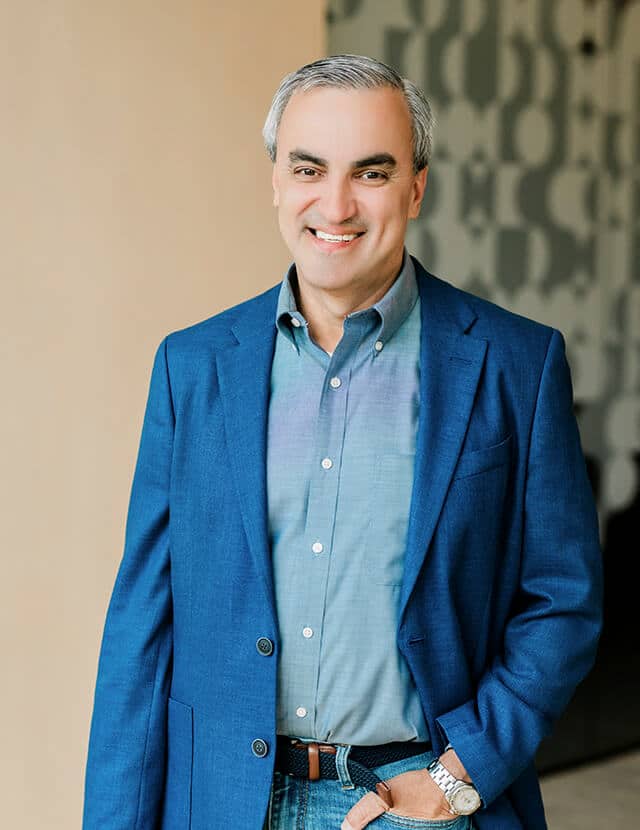|
Getting your Trinity Audio player ready...
|
No one starts college thinking they are going to be a “tax guy.”
“That’s certainly true for someone studying economics,” explains Anthony Curtis, who graduated from George Washington University in 1990. Still, Curtis has carved out a successful career in the field, currently serving as senior director of global tax strategy and tax controversy leader for McDonald’s. (He’s also the global finance inclusion leader, but more on that later.)
Curtis’s parents had met in Puerto Rico when his father was stationed there in the Air Force, and they married and moved to Monson, Massachusetts. Monson was small—about eight thousand people—and his mom was only the second Latina in town.
“Growing up in a biracial family, I was different than everyone, and that had its positives and negatives,” Curtis shares. “I still had great opportunities. I did well in school, and I knew I had an interest in business, but I also knew I needed to leave Monson and go somewhere bigger—and somewhere far enough away where I wouldn’t go home on weekends.”
That’s why he went to DC, and he set out initially to be a corporate lawyer. But after working for a law firm during his sophomore and junior years of college, Curtis decided he was more interested in getting an MBA.
“I was always a numbers person; I was a math nerd in high school,” he recalls. “I was a member of the Math League, and we would travel on buses to compete against other schools. I played soccer and other sports as well, but I was definitely a math guy when it came to academics.”

He feels lucky that his parents—his dad was a sheet metal mechanic and his mom was a homemaker who babysat for several kids—were able to pay for his education, but it was up to him to pay for his living expenses. That meant Curtis balanced multiple jobs, including being the RA in the dorms and working outside of school.
“But I realized that if I wasn’t going to be a lawyer, I should probably leave the law firm,” he says. “I went to career services and looked through a book for jobs, and I saw an opportunity at Coopers & Lybrand, the predecessor firm for PwC, and that paid $2 an hour more, and that’s all I needed to know.”
Curtis’s responsibilities amounted to faxing, filing, and photocopying tax legislation, and that’s how he got into the tax industry. “Seven months later, I was talking to my boss, and I told her I loved working there, but I couldn’t imagine a job more boring,” he says. She learned his major was economics, prompting her to lead him down the hall and introduce him to the partner of its economist team. “Hire him,” his boss told the partner.
“It was such a loose, painless way to find your way into a job, and I wound up staying there for thirty years,” Curtis says. “I never expected to stay that long. I really enjoyed it. I had told them I would move to any city in the world besides New York City because I thought it was too big, too crowded, and I was a Red Sox fan, but after looking at options, they felt New York was the best place for me to go, so I went.”
He ultimately made partner in the year 2000 and accomplished a great deal while at the firm, including being a leading partner in the firm’s efforts around inclusion.
“I wouldn’t have achieved many of my personal accolades without them. Now, it’s up to me to be a mentor to as many of those people as I can.”
Anthony Curtis
But Curtis retired from PwC in 2020, taking a year and a half off to spend time with his kids (now twenty-one, twenty-three, and twenty-four) during the pandemic as they were getting ready for college themselves. Eventually, he felt the itch to work again, and knew there was some more he wanted to contribute, but this time he wanted to do so on the in-house side rather than the consulting side.
That’s when then the opportunity at McDonald’s came knocking, and he’s doing basically the same tax technical work he had done at PwC.
“I help with tax planning efforts, transfer pricing, and try to prevent or resolve any tax controversies with tax authorities around the world,” he explains. “Now, I’m leading our in-house team and bringing in the consultants instead of being the consultant, and even though my experience is often greater than many of those coming in, I want to make sure we are considering all options and opportunities to get the optimal results.”
Curtis’s additional role—global finance inclusion leader for the mega foodservice retailer—is dedicated to fostering inclusion within the finance segment.
“I’m wearing the inclusion hat again to help make sure we attract the best, brightest, and those with the most potential to achieve success and help them unleash their full potential,” Curtis explains.
He also became board chair of the Association of Latino Professionals for America (ALPFA) in 2023, an organization he has been involved in for more than two decades, looking to empower the next generation of Latino and Latina leaders. Not only was McDonald’s content with him continuing his work for the organization while working there, but it became a sponsor, which Curtis really appreciated.
“Growing up Latino in my town was interesting because all of my friends were white, and I didn’t really think about the influence being Latino had on me,” he says. “As I started to see some of the challenges others like me faced, some I faced and didn’t even acknowledge, it became obvious to me there was a need to help others who were trying to do what I was doing and help impact their careers.”
Curtis understands the importance a mentor can have on someone and their success and hopes he can provide the same help and guidance he has received over the years.
“I’ve had dozens of true mentors and hundreds of people who have mentored me from time to time over my career,” he shares. “I wouldn’t have achieved many of my personal accolades without them. Now, it’s up to me to be a mentor to as many of those people as I can.”
He’s grown to love being known as a “tax guy,” and it’s a career that has led to tremendous success.

